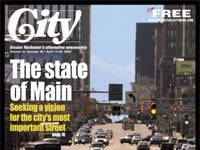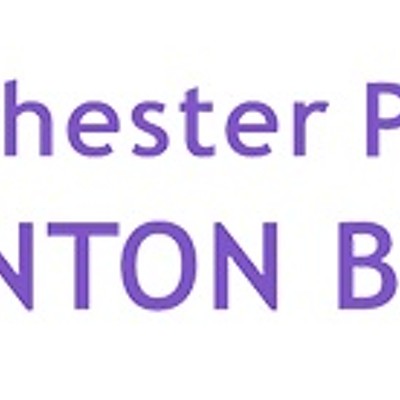[
{
"name": "500x250 Ad",
"insertPoint": "5",
"component": "15667920",
"parentWrapperClass": "",
"requiredCountToDisplay": "1"
}
]
Three years ago, American writer James Howard Kunstler sat down with famed urbanist Jane Jacobs in her Toronto home. Kunstler asked her why she'd settled in Toronto. "We came in protest of the Vietnam War," said Jacobs, who grew up in Scranton and came into her own in New York City, struggling against a highway that would have eviscerated Greenwich Village.
"We had two draft-age sons," she said. "And, oh my, this was a time when the US was very scared about Sputnik... And so we decided to come to another country. We are just not cut out to be citizens of an empire." Jacobs' story is one of thousands that tell a hidden history: how our true "best and brightest" went into exile.
Jacobs also touched on something relevant to the ongoing Rochester-Toronto squabble. "Americans don't really think that other places are as real as America," she said. "This... may be the biggest difference between Americans and people elsewhere. Canadians know that there are places just as real as Canada. It's a self-centeredness that's a very strange thing. [Americans] have got it so dinged into them that they are the most fortunate people on Earth and that the rest of the world --- the sooner it copies what America is like, the better."
No self-respecting city would have taken the Globe and Mail's Jan Wong seriously when she slammed Rochester's scary streets and bad food. She's known as a "celebrity journalist," after all. (And how come we never hear brisk debates about Naomi Klein, the Globe and Mail's expert on corporate globalization?)
But what's with the Democrat and Chronicle's booster-blather and provincialism? On December 3, the D&C editors talked about taking "the high road." Yet they backhandedly deplored Canada's "frayed national health system," smugly unaware of its superiority to the US model. Worse, they accused Canadians of having "a culture essentially ripped off from America." Aren't editors supposed to know the difference between appropriation and imposition?
Then the D&C had the gall to run a Saturday front-pager that was second-grade both in quality and level of sophistication. The food in Toronto is pricey and "gross," as the headline put it? Well, if reporter Lisa Hutchurson and company restrict their diets to poutine and Planet Hollywood, that's their problem.
I couldn't help noticing some details in a photo the D&C ran to showcase Torontonian drugs and prostitution. Frankly, I couldn't see much of the latter in the photo. I did see people on the sidewalk, a demarcated bike lane, and an undefiled "street wall" of old buildings. If certain Rochesterians were in charge up there, the buildings would have been razed for some "central station" or other, and bicyclists would be on their own.
Not to downgrade Rochester overall. We've got our own great restaurants. And did I mention museums?
But let's face it: We're a satellite city, and there's a big difference between our role and that of a metropolitan center. Each has its virtues and functions; each depends on the other. If we want to present our best face to other cities --- and to ourselves --- we should be concentrating on this area's real strengths. Here's a big one: Despite sprawl, we've still got lots of prime farmland that can serve urban populations. Metro/regional economies --- here Rochester and Toronto form a unit --- sink or swim on the sustainability of local food systems.
Ultimately, inter-city relationships are built on intra-city ones. Communities known for justice and rough equality become destinations without hardly trying. In this light, compare the Canadian "cultural mosaic" to our "melting pot." I think the mosaic has the advantage.
Rochester's biggest deficit is structural racism --- apartheid, American-style. Next to corporate disinvestments, racism is the most fundamental cause of American urban decline. Our leaders are busily dismantling the nation's social welfare systems; Canadians are recovering the political will to reinforce theirs. Toronto just chose an authentic progressive as mayor: Among David Miller's first acts was appointing Jane Jacobs to his transition advisory team.
Anything comparable happening here? In jurisdictional terms, Miller's counterpart here is new County Executive Maggie Brooks. Her platform is basically pro-apartheid.
When I was growing up in Niagara Falls, New York, Toronto was literally a beacon.
My favorite English teacher was an American living in Niagara Falls, Ontario. Today she lives in Toronto; she generously gave her classes a taste of the "big city" with field trips to Toronto's theaters and restaurants. I also listened to the CBC every day on the old 740 AM. One of my favorites was Gilmour's Albums, a classical-music sampler. Host Clyde Gilmour especially loved tenors. In later years, he'd stack his beloved JussiBjoerling up against the likes of Luciano Pavarotti. Now there's a competition.
Then there was the late Peter Gzowski, one of the best interviewers on record. When I lived in the Finger Lakes in the 1970s, Gzowski was going strong. The CBC was doing things that NPR was only learning at the time.
Toronto radio helped push me toward the Eastman School of Music, though my hometown piano teacher, a Canadian by birth, graduated from Toronto's Royal Conservatory. Yes, things come around. I once interviewed Jane Jacobs about the fast ferry, which she hadn't heard about; she mentioned that her granddaughter was studying at Eastman and loving it. I told her my son, a University of Toronto urban studies major, was living only blocks from her home.
More history: Emma Goldman, one of Rochester's world citizens, died in Toronto in 1940. She was in exile after deportation during one of America's periodic Red Scares (unfortunately not over; compare Toronto's relationship to Havana, as opposed to ours.) It's said that Goldman went to Windsor, Ontario, looked longingly at Detroit across the water, and imagined distant Chicago. "I need not tell you how cramped I feel and how I long for intellectual companionship" she wrote in one letter from Toronto.
That was before Toronto began its growth spurt and American corporations abandoned Upstate New York. Can you believe it? Two generations ago, Greater Toronto's population (1.117 million in 1951) roughly equaled that of Buffalo-Niagara (1.089 million in 1950).
Goldman also expressed gratitude for her "devoted friends and comrades" in Toronto. I wish all of Rochester would grow up and do the same.
Speaking of Toronto
-

The F Word: I Scene It – Nick Cave & The Bad Seeds
Oct 30, 2018 -

Hey, bud
Aug 3, 2005 -

Orbits and other fallacies
Jul 20, 2005 - More »
Latest in News
More by Jack Bradigan Spula
-

The state of Main
Apr 14, 2004 -
School improvement: the price is wrought
Apr 7, 2004 -
Hour of power
Mar 31, 2004 - More »





